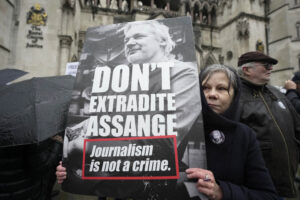Truthdigger of the Week: Alexa O’Brien
Alexa O'Brien believes that work is the purpose of life. Right now, her life consists of bringing the government's prosecution of Pfc. Bradley Manning to the public.
believes that work is the purpose of life. Right now, her life consists of bringing the government’s prosecution of Pfc. Bradley Manning to the public.
For more than a year, O’Brien has been one of a handful of journalists who have had access to the pretrial hearings of Bradley Manning, the young man accused of providing WikiLeaks with documents that revealed government wrongdoing. Because of the trial’s significance, the hearings are held away from public view in a soundproof room inside Fort Meade in Maryland — a nerve center for the U.S. government’s global intelligence activities, and officials are doing everything they can to keep the details of the case to themselves.
“The U.S. government is conducting this trial in obscurity,” O’Brien said in a telephone conversation. “They want to manage the message coming out of Fort Meade.” The press in general has no access to more than 30,000 pages of filings related to the trial, nor a transcript of the legal proceedings, she said. So over the year of her involvement, O’Brien has spent as many as 15 hours a day transcribing the hearings herself.
This makes O’Brien an archivist. She is one of the few primary sources making the trial available to journalists, scholars and the public. Truthdig columnist Chris Hedges said in an email that O’Brien “is the only way most of us who follow the trial know what is going on.” Because the judges speak quickly, her transcripts are often rushed. In instances where the court won’t allow journalists to use computers, she scribbles in shorthand in a notebook. All of the material, which includes official documents, journalism and other public documents pertaining to WikiLeaks, its founder Julian Assange, the press and government secrecy, is being published on an easy-to-use timeline dating back to 2006 at usvwikileaks.org.
“The whole purpose of this project is easy access,” she said, “to aggregate and curate information in a way that’s useful and scalable for people, so the public can find the information it needs.”
O’Brien’s work has made her a target of American officials as well. She is a plaintiff in the lawsuit led by Hedges against President Obama over the 2012 National Defense Authorization Act. The law permits the government to indefinitely detain anyone U.S. officials deem to be associated with terrorism. Like other critics of the government’s “anti-terror” program, O’Brien fears officials will use the law to silence her. Her fear is justified. Katherine Forrest, a federal judge for the Southern District of New York who ruled against the law last year, reportedly said of the archivist:
“O’Brien has written a series of articles already–some of which relate to al-Qaeda, the Taliban, or ‘associated forces’ no matter how defined. The Government was unwilling to state at the hearing that O’Brien would not be detained under [section] 1021 for her expressive conduct in regard to those articles. Moreover, O’Brien testified that she has withheld at least two articles from publication because of her concerns regarding the potential for her expressive conduct in those articles to render her a ‘covered person’ under [section] 1021 and thereby subject her to military detention.”
With the NDAA and the prosecution of Manning, the government is treating open criticism of its own wrongdoing as an act of aggression. Americans who dare to reveal their country’s secret offenses abroad or at home, whether they be journalists, officials or concerned citizens, are now subject to powers that could have them legally jailed or assassinated.
There is a double standard at work here. Veteran Washington Post journalist Bob Woodward can get away with publishing classified information from high-level sources, even when he comes recommended by Osama bin Laden. But journalists who agitate in the wrong direction are treated as potential enemy combatants.
When it is national policy to conceal official crimes, the task of truth-telling falls to the private citizen. Those who make the effort do so at great personal risk. As an organizer of Occupy Wall Street and a founder of U.S. Day of Rage, O’Brien has become a visible target of the state. Government contractors have falsely linked U.S. Day of Rage to al-Qaida. A Department of Homeland Security bulletin claimed the group was involved in so-called cyberterrorism, and contractors have hounded her with messages claiming she is otherwise involved in activities hostile to the United States.
“Citizenship is a public office,” O’Brien wrote in a letter on her site. “[B]ut who among us can risk engaging in the body politic authentically, when we have families to provide for? Who can risk publishing about the workings of Government, our alliances, and wars when you might end up in my position?” For those who value their personal safety, the answer is very few of us. O’Brien knows the risks she faces. For committing herself anyway to work she knows must get done, we honor her as our Truthdigger of the Week.
Your support is crucial…With an uncertain future and a new administration casting doubt on press freedoms, the danger is clear: The truth is at risk.
Now is the time to give. Your tax-deductible support allows us to dig deeper, delivering fearless investigative reporting and analysis that exposes what’s really happening — without compromise.
Stand with our courageous journalists. Donate today to protect a free press, uphold democracy and unearth untold stories.









You need to be a supporter to comment.
There are currently no responses to this article.
Be the first to respond.